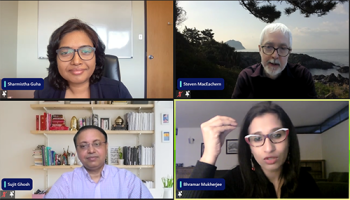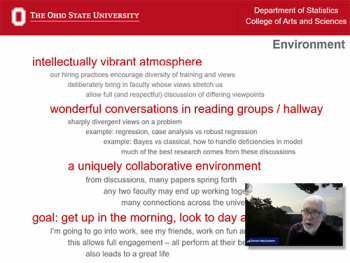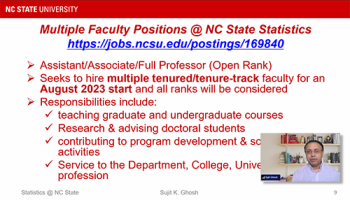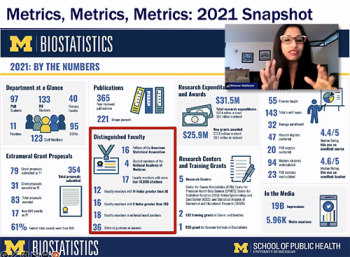



For those on the job market or even anyone in the middle of a career these career fairs are a unique and knowledgeable window into the positions that become available in a variety of professional settings for statisticians. This session focuses on professorial positions at academic institutions. (see Event page) However, it will also become clearly evident that the advice that these experienced administrators will share, is not just about professional careers, but also about life in general.
The speakers for this career fair session were Steve MacEachern (Department of Statistics at The Ohio State University), Bhramar Mukherjee (Department of Biostatistics at University of Michigan) and Sujit Ghosh (Department of Statistics, North Carolina State University) were the speakers for this event. Sharmistha Guha (Department of Statistics at Texas A&M University) was the moderator for this session. All of the speakers took the time to describe their own department, the types of research and teaching opportunities that exist at each as well as their philosophy for each of their respective departments. In addition, all of the speakers described the variety of resources that are available to new faculty at each of their institutions.
Besides information about the Ohio State Department of Statistics, Steve MacEachern started off by emphasizing advice both in terms of research and teaching, but also advice in terms of your personal life, i.e., thinking about what is a good fit for you personally. He shared the type of atmosphere that his department tries to put into place to make Ohio State not only an interesting and challenging place to conduct research, teach and mentor, but also to grow and have a fulfilling life.
"Faculty careers change through time. So, what somebody is doing in their Ph.D. disstertation might be completely different than what they are doing 10, 20 years later. That kind of evolution and change is actually very healthy. Our hope is that people continually pick up more things, broader knowledge, deeper knowledge and then they can use that in the future."
Steve MacEachern - Ohio State
Sujit Ghosh carefully reviewed the faculty positions that his department is currently seeking to fill at NC State's Department of Statistics. Among the many aspects and resources associated with these new positons Sujit mentioned that new faculty are assigned two mentors, one that will focus on research and another separate mentor that focuses on teaching. His department makes it clear that it values both of these aspects of their positions and works to spend the time to encourage conversations with more experienced faculty in both of these areas.
"The importance of a mentor is obvious. You just need to think of sports. Can you think of any sport where you don't have a coach? The same thing goes with education. Although we don't call them a coach, that is what the mentor is for."
Sujit Ghosh - NC State
Bhramar represents a department of Biostatistics, a department founded in 1949! She first made it clear that it is important to not only to engage in research but also to have fun and enjoy working and getting together as people. She also made the point to determine what the college environment in which your department is housed. Some departments have a liberal arts, or a science orientation whereas Michigan's Department of Biostatistics is in a School of Public Health. This environment influences the mission of the department and as a candidate you should be aware of this impact. Among her many comments, Bhramar also emphasized that her department encourages their faculty to think about not just goals and objectives but values that can be shared including things such purposeful inclusion and bold exploration of new ideas!
"No mentoring, at any step of your career gets wasted - these are words of wisdom. Advice is always free and you hold it all your life so that you can dip into it as the need arises."
Bhramar Mukerjee - University of Michigan
Moderator Sharmistha Guha spent a large amount of the remainder of the session to pose questions to each of the speakers. It is from these questions that the attendees are able to gain valuable advice regarding interviewing, getting started as a new faculty member and other extremely important suggestions that any candidate will treasure.
Below is a recording of the session. You should be able to also link back to previous NISS Career Fair sessions as well. Also, here is a link to the original event page.
